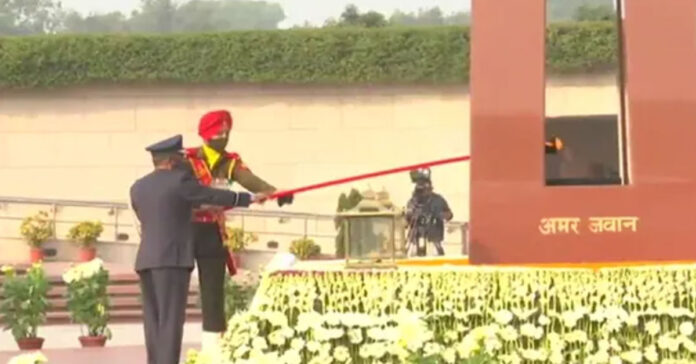The Amar Jawan Jyoti at India Gate in Delhi which was constructed after the Indo-Pakistani War of 1971 to commemorate the martyred and soldiers of the Indian Armed Forces who died during the war, is extinguished and merged with the torch at the National War Memorial today.
The War Memorial is 400 meters away in the heart of the capital. It was built in 2019, whereas, the Amar Jawan Jyoti was built 50 years ago.
A great ceremony was organized in which soldiers marched from India Gate to the New memorial carrying the flame. A military parade, band and salute were included in the ceremony.
Criticism
This move displeased many and is received with mixed feelings. However, critics say it is an attempt to erase history with poor regard to tradition.
Clarifications by the Government
According to government sources, “lot of misinformation” was circulating, that the flame at India gate paid homage only to the martyrs of the 1971 war.
Moreover, they added that “the flame of the Amar Jawan Jyoti is not being extinguished. It is being merged with the flame at the national war Memorial. It’s an odd thing to see that the flame at Amar Jawan Jyoti paid homage to the martyrs of the 1971 and other wars but none of their names are present there.”
True Tribute
Government sources added that the true ‘shraddhanjali’ (tribute) to the martyrs would be, to have a flame at the National War Memorial. Moreover, the names of Indian soldiers who died in wars after Independence, including the 1971 war are engraved here.
India Gate
The India Gate was built by the British as a memorial to the soldiers of the British Indian Army who died in World War-I. However, the Indira Gandhi led Congress government placed the Amar Jawan Jyoti under the India gate in 1971.
The present government claims that the names inscribed on the India Gate are those who fought for the British in World War-I and the Anglo-Afghan War. It describes it as “a symbol of our colonial past’.
Views of the People
Many leaders and retired veterans condemned the move on social media and statements. Few of them also feel that instead of wasting money in building memorials and flames, the government could have used the money for the welfare of the families of the martyrs.


